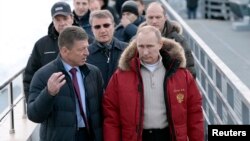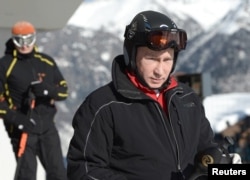MOSCOW —
Russian President Vladimir Putin began inspecting Winter Olympic venues in the Black Sea resort of Sochi on Friday, five weeks before the start of an event that has been dogged by human rights criticism and security worries.
In footage shown on state TV channel Rossiya-24, Putin, 61, was shown gliding down a ski slope wearing dark glasses and a helmet. He and Prime Minister Dmitry Medvedev also met surprised athletes and inspected hotels in the city.
Putin's spokesman said he would check out all venues "in detail" in the coming days and watch a rehearsal of the opening ceremony.
The success or failure of the Olympics will form a big part of Putin's legacy. He has closely identified himself with the $50 billion project, ever since flying in person to Guatemala in 2007 to persuade Olympic chiefs to award the Games to Sochi.
When the ski-jump venue fell behind schedule last year, Putin not only fired a senior official but publicly humiliated him on television.
The recent build-up to the event has been troubled: two suicide bombings killed 34 people this week in Volgograd, some 700 km (400 miles) northeast of Sochi, highlighting the threat from Islamist insurgents who have vowed to disrupt the Games.
The International Olympic Committee has said it has no doubt Russian authorities will be able to provide security.
Moscow has also drawn heavy criticism of its human rights record and a law banning the spread of "gay propaganda" among minors, which activists and Western governments say violates basic freedoms.
In a move to disarm critics before the Games, Putin last month freed several of the country's best known prisoners: former oil tycoon Mikhail Khodorkovsky and two members of the female punk group Pussy Riot.
In footage shown on state TV channel Rossiya-24, Putin, 61, was shown gliding down a ski slope wearing dark glasses and a helmet. He and Prime Minister Dmitry Medvedev also met surprised athletes and inspected hotels in the city.
Putin's spokesman said he would check out all venues "in detail" in the coming days and watch a rehearsal of the opening ceremony.
The success or failure of the Olympics will form a big part of Putin's legacy. He has closely identified himself with the $50 billion project, ever since flying in person to Guatemala in 2007 to persuade Olympic chiefs to award the Games to Sochi.
When the ski-jump venue fell behind schedule last year, Putin not only fired a senior official but publicly humiliated him on television.
The recent build-up to the event has been troubled: two suicide bombings killed 34 people this week in Volgograd, some 700 km (400 miles) northeast of Sochi, highlighting the threat from Islamist insurgents who have vowed to disrupt the Games.
The International Olympic Committee has said it has no doubt Russian authorities will be able to provide security.
Moscow has also drawn heavy criticism of its human rights record and a law banning the spread of "gay propaganda" among minors, which activists and Western governments say violates basic freedoms.
In a move to disarm critics before the Games, Putin last month freed several of the country's best known prisoners: former oil tycoon Mikhail Khodorkovsky and two members of the female punk group Pussy Riot.






